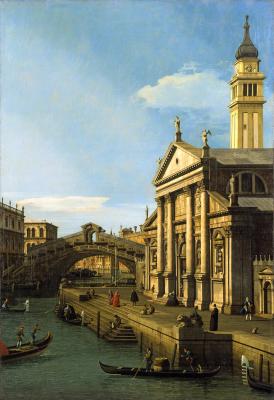
Trained by his father, a painter of theatrical scenery, Canaletto specialized in views of his native Venice. By the 1730s, he was one of the most successful artists in Europe, his most avid patrons being the English aristocrats who came to Venice on their ‘Grand Tours’ of Europe and commissioned painted views of the city as souvenirs. Canaletto’s precise technique helped to invest these views with the illusion of topographical accuracy. A contemporary wrote: “He paints with such accuracy and cunning that the eye is deceived and truly believes that it is reality it sees, not a painting.” However, the artist often subtly adjusted architectural details, viewpoints, and topography to create a more picturesque and harmonious work of art; on occasion, he took even greater artistic license. This painting combines in a single setting three famous landmarks from different areas of Venice: the Rialto Bridge and the Church of San Giorgio Maggiore, located on an island at the entrance to the Grand Canal. The Italian word capriccio, meaning whim or fancy, is used to describe these fanciful compositions.

